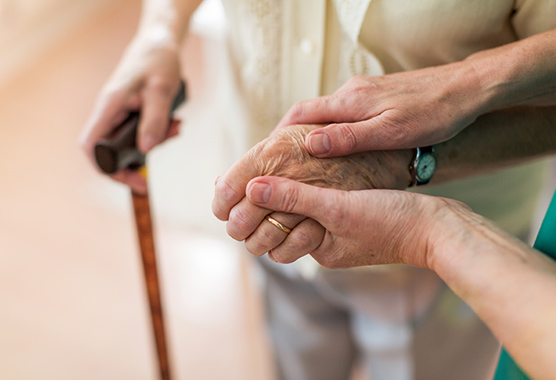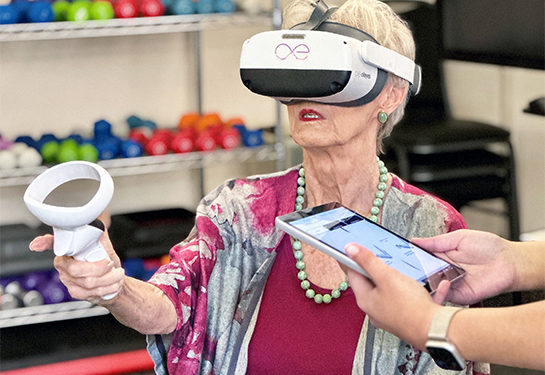Alzheimer’s Disease
Alzheimer’s disease is the most common cause of dementia. While there is no cure, our healthy aging specialists can help you manage your symptoms.
Medically reviewed by David Bissig, M.D. and Sarah Tomaszewski Farias, Ph.D. on July 18, 2025.

Alzheimer's Disease
Alzheimer’s disease is a brain disorder that gradually weakens your memory and thinking skills. Over time, it affects your ability to function. It may also cause changes in your personality and behavior. Alzheimer’s disease is the most common cause of dementia.
We provide compassionate support and helpful resources to patients and their families. We also support research advancement through the Alzheimer’s Disease Research Center at UC Davis Health.
Alzheimer’s Disease Symptoms
The first sign of Alzheimer’s disease is usually short-term memory loss. You may not notice you’re having issues remembering things. Sometimes it’s more obvious to friends or family members.
Common Symptoms
Other signs of Alzheimer’s disease may include:
- Memory loss
- Disorientation and confusion
- Mood and behavior changes
- Difficulty completing familiar tasks
- Poor judgment
- Getting lost in a familiar place
- Difficulty expressing oneself
Causes of Alzheimer’s Disease
The exact causes of Alzheimer’s disease are unknown. But scientists believe it occurs when two proteins fail to function properly. This damages neurons and causes them to die over time. The two proteins are:
Plaques
These are deposits of a protein fragment called beta-amyloid. They clump together and have a toxic effect on neurons.
Tangles
These are twisted fibers of a protein called tau. Buildup of abnormal tau injures brain cells.
Alzheimer’s Disease Risk Factors
Several factors can increase your risk of Alzheimer’s disease, including:
Older Age
Alzheimer’s is most common in people 65 and older. The older you get, the greater your chance of getting the disease.
Family History
Having a first-degree relative (such as a parent or sibling) with Alzheimer’s increases your risk of developing the disease.
Diagnosing Alzheimer’s Disease
To diagnose Alzheimer’s disease, your provider(s) will perform a physical and neurological exam and some form of cognitive (memory) testing. This may include neuropsychological testing. Your provider will also ask about your symptoms and medical history. If they think you may have Alzheimer’s disease, they may order additional tests.
A blood test will help us rule out other potential causes of your symptoms. It's also likely that your provider will order images of your brain, such as an MRI, to see possible changes caused by Alzheimer’s, like atrophy. Other forms of brain imaging may be ordered.
Treatments for Alzheimer’s Disease
There is no known cure for Alzheimer’s disease. But there are medications we can prescribe to help reduce your symptoms, such as:
Cholinesterase Inhibitors
These medications prevent the breakdown of acetylcholine, a brain chemical that aids memory and thinking.
Anti-amyloid Therapies
This immunotherapy drug treats early Alzheimer’s. It helps reduce amyloid plaques in the brain.
Memantine
This medication is prescribed for moderate to severe Alzheimer’s. It regulates an important brain chemical called glutamate, which may contribute to brain cell death.
Preventing Alzheimer’s Disease
Alzheimer’s disease cannot be prevented. But there are things you can do to reduce your risk, such as:
Manage Your Blood Pressure
High blood pressure may increase your risk of Alzheimer’s disease.
Stop Smoking
Quitting smoking may maintain brain health and reduce your risk of Alzheimer’s disease.
Maintain a Healthy Weight
Exercising regularly and eating a healthy diet may lower your risk of Alzheimer’s.
Keep Your Mind Active
Go to social events, play games, learn new things, read, or create art. These activities may help lower your risk of Alzheimer’s.
Alzheimer’s disease affects
6.7MAmericans aged 65 and older
About
2/3Of Americans with Alzheimer’s are women
Alzheimer’s Association: Alzheimer's Disease Facts and Figures
Request an Appointment
As Sacramento's No. 1 hospital, you'll benefit from unique advantages in primary care and specialty care. This includes prevention, diagnosis and treatment options from experts in 150 specialties.
Referring Physicians
To refer a patient, submit an electronic referral form or call.
800-4-UCDAVIS
Patients
Call to make an appointment.
Consumer Resource Center
800-2-UCDAVIS

Ranked among the nation’s best hospitals
A U.S. News & World Report best hospital in cardiology, heart & vascular surgery, diabetes & endocrinology, ENT, geriatrics, neurology & neurosurgery, and pulmonology & lung surgery.

Ranked among the nation’s best children’s hospitals
U.S. News & World Report ranked UC Davis Children’s Hospital among the best in pediatric nephrology, orthopedics*, and pulmonology & lung surgery. (*Together with Shriners Children’s Northern California)

Ranked Sacramento’s #1 hospital
Ranked Sacramento’s #1 hospital by U.S. News, and high-performing in aortic valve surgery, back surgery (spinal fusion), COPD, colon cancer surgery, diabetes, gynecological cancer surgery, heart arrhythmia, heart failure, kidney failure, leukemia, lymphoma & myeloma, lung cancer surgery, pacemaker implantation, pneumonia, prostate cancer surgery, stroke, TAVR, cancer, orthopedics, gastroenterology & GI surgery, and urology.

The nation’s highest nursing honor
UC Davis Medical Center has received Magnet® recognition, the nation’s highest honor for nursing excellence.

World-class cancer care
One of ~59 U.S. cancer centers designated “comprehensive” by the National Cancer Institute.

A leader in health care equality
For the 13th consecutive year, UC Davis Medical Center has been recognized as an LGBTQ+ Healthcare Equality Leader by the educational arm of America’s largest civil rights organization.
Latest Neurological News
-
FEBRUARY 11, 2026
UC Davis scientists named to 2026 TIME100 Health List
-
JANUARY 26, 2026
Protecting newborn brains from epilepsy and injury
-
JANUARY 06, 2026
Team of doctors save pregnant woman from spinal fluid cyst
-
DECEMBER 08, 2025
UC Davis designated a NORD Rare Disease Center of Excellence

